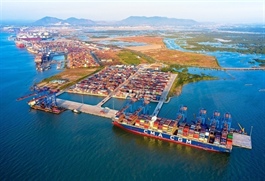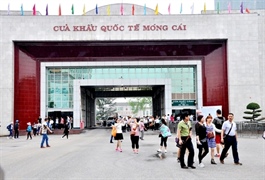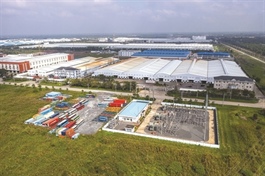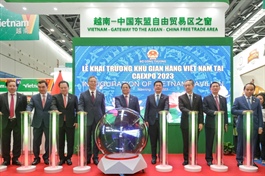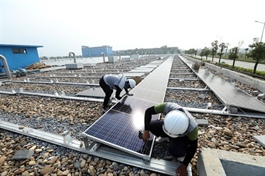Vietnam stepping up efforts for growth
Vietnam stepping up efforts for growth
The Vietnamese government has made an urgent order to spur on industrial production and boost administrative reforms to fuel economic growth.

Prime Minister Pham Minh Chinh last week required ministries and localities to “double efforts” to remove all obstructions to recover industrial production in a quicker manner, with a focus laid on manufacturing and processing activities.
“Industrial production is beginning to bounce back, so boosting it must now be a pivotal and imperative task to boost economic growth,” PM Chinh stated at last week’s government cabinet meeting on the country’s socioeconomic performance. “Now we have to find out solutions to recover supply chains and accelerate the construction of large-scale projects.”
The Ministry of Planning and Investment (MPI) last week reported to the government that so far this year, Vietnam’s index for industrial production (IIP) decreased 0.4 per cent as compared to the same period last year, when it climbed 9.4 per cent on-year.
The eight-month IIP for processing and manufacturing, which creates more than 80 per cent of industrial growth, reduced 0.6 per cent as compared to the same period last year.
However, the rate has gradually been recovering in August, at 2.9 per cent on-month and 2.6 per cent on-year. Meanwhile, the on-year IIP in July increased only 2.3 per cent, said the MPI, adding that the Purchasing Managers’ Index of the industrial production sector hit 50.5 points in August, “showing an expansion in production with the volume of new orders and output bouncing back.”
The IIP for processing and manufacturing in August ascended 3.5 per cent on-year, still lower than the on-year rise of 3.6 per cent in July but higher than 2.8 per cent in June.
Dao Thu Trang, head of Business Development Services of AHK Vietnam, told VIR that she believes the existing IIP is just for the short term. “Vietnam’s industrial production sector is surging to become a magnet to foreign investors, including those from Germany,” she said.
Trang cited a recent AHK survey as stating that a significant majority, 91 per cent, of German companies have expressed their intention to continue investing in or expanding their production in Vietnam. Additionally, around 40 per cent of these companies are planning to increase their workforce in the next 12 months.
“These figures highlight the attractiveness and potential of the Vietnamese market for German investors,” Trang said.
In an example, German-backed KURZ Vietnam last week inaugurated its state-of-the-art factory in the south-central province of Binh Dinh’s VSIP Binh Dinh to manufacture Luxor and Alufin films.
KURZ’s venture in Vietnam marks the first high-tech initiative from Germany in Binh Dinh. The 12-hectare factory, in its first phase, boasts a total registered investment capital of $40 million, and a production capacity of 15 million square metres of products a year.
“German businesses still consider Vietnam as one of the most potential developing markets in Asia. Moreover, with Germany’s investment diversification strategy, Vietnam is being evaluated as a promising and reliable investment destination for German enterprises,” Trang said.
However, she also added, “To further improve investment in Vietnam and enhance its attractiveness as a destination for foreign investors, the government should continue its efforts to streamline administrative procedures, to invest in infrastructure development, particularly in transportation and logistics.”
PM Chinh last week also ordered ministries to boost administrative reform in favour of investors and businesses. “Enterprises are still facing numerous administrative obstructions. Ministries and localities are requested to focus on reviewing all legal regulations, mechanisms, and policies. Any improper policies and regulations must be removed immediately,” he stressed. “No more unnecessary procedures are allowed to be enacted, as they will increase costs and time for people and enterprises.”
Despite difficulties, the government is still steadfast to an economic growth target of 6-6.5 per cent this year, but global analysts FocusEconomics said that the economy is projected to miss this target due to subdued private spending and exports.
“Nevertheless, stronger public spending and looser monetary policy mean Vietnam should remain among ASEAN’s top performers,” FocusEconomics said. Its panelists see Vietnam’s GDP expanding 5 per cent in 2023 and 6.3 per cent in 2024.




